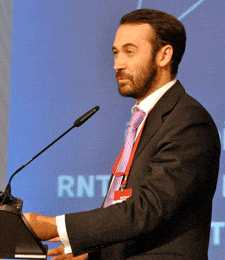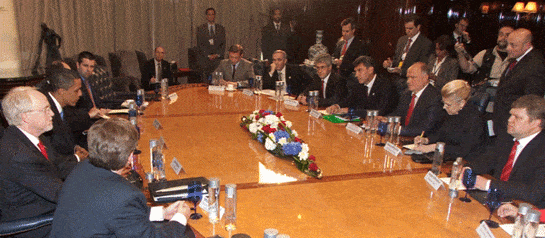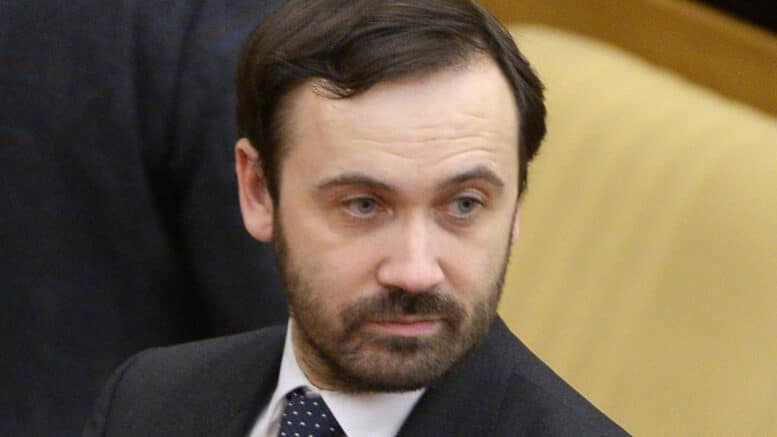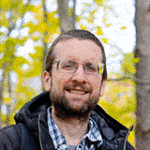Ilya Ponomarev has been involved in information technology (IT) in Russia since the fall of the Soviet Union. He entered the business side of technology in 1991 when he founded his own IT business. He later merged into a Russian-American joint venture and later left that venture and then worked for several oil firms. He joined politics in 2002 as a member of the Communist Party (and helped to create their website). In 2004, he additionally helped found the “Left Front” political movement, which promises “land to the farmers, factories to the workers, and power to the Soviets.”

Ilya Ponomarev presenting at a 2009 conference on developing an information society in Russia. Photo from Computerra.ru
Within both the Moscow city government and the Russian federal government, Mr. Ponomarev has worked on several projects aimed at boosting entrepreneurship and spreading technology. This included work on creating Russia’s special economic zones for technology parks.
In 2007 he left the Communist Party, saying that they had “fallen under Kremlin control” and joined Fair Russia, a social democratic party. That same year he was elected to the Russian Duma as a representative of Novosibirsk, where one of the new technology special economic zones is located. He was shortly thereafter appointed chairman of the Duma’s Subcommittee on High Technology. He continues his work with Left Front.
On July 7, 2009, Mr. Ponomarev took part in a meeting that US President Barack Obama held with Russian civil society figures. In preparation for this, he composed a letter, with English translation, and posted it for discussion on his LiveJournal blog. What appear below are the final Russian and English versions of that letter as posted on that blog.
While the discussion sparked by the post resulted in other issues being suggested, the letter remains focused on three main bulleted points. First, it advocates that America appoint a special envoy to “demonstrate the working mechanisms of American democracy” of which labor unions are specifically named. The other two points both deal with technology issues. Point two proposes joint efforts to stop Internet censorship and cybercrime as well as to bring Internet infrastructure to more areas outside the US. Point three is dedicated to arguing for scientific and economic cooperation and specifically for assistance in founding a new technology college in Russia based on the MIT model in the States.

The above picture shows the meeting US President Barack Obama held with Russian civil society leaders. While Ilya Ponomarev is not seen here, other opposition politicians are. Gennady Zyuganov, leader of the Communist Party, is seated third from the right. Boris Nemstov and Gary Kasparov, both of the Solidarity Movement, are seated fourth and sixth from the right, respectively. President Obama is seated center left. Photo posted to ЖЖ.
A few detractors on the LiveJournal page argue that this is moving back to the relationship that the US and Russia shared during the 1990s, with America intervening quite directly in Russian politics and making substantial investments into Russia for what might be considered as “humanitarian” purposes.
In any case, the text certainly seems to outline a US-Russia relationship that would be much more open than any we would have had in the past decade. Outside of that, much can be gleaned and debated about the implications of the proposals and rhetoric used here. We’ll leave all that to the reader, though with one last note to point out that Ponomarev’s translator (an unnamed American Ph.D. in linguistics) has taken a number of liberties, such as inserting “yes – we can” near the end of the English even though the phrase does not directly occur in the Russian.
| Глубокоуважаемый г-н Президент! | Dear Mr. President! |
| Разрешите поблагодарить Вас за возможность встречи в ходе Вашего визита в Москву. На мой взгляд, прямой диалог очень важен сегодня для наших стран и является важным сигналом российскому политическому истеблишменту. | Let me thank you for the opportunity to meet you during your visit to Moscow. In my opinion, direct dialogue is very important today for our countries and represents a vital signal to the Russian political establishment. |
| Хотелось бы акцентировать внимание на нескольких вопросах, которые мне видятся особо актуальными для развития нашего сотрудничества. | I would like to draw your attention to a number of questions, which seem to me particularly relevant for the development of our cooperation. |
| Как мне представляется, за постсоветский период, и особенно за период с 2000 по 2008 гг., в отношениях между Россией и США было совершено много ошибок, как с российской, так и с американской стороны. Нам не удалось убедить российское руководство отойти от сверхпрагматичного и циничного понимания интересов Америки, основанного на убежденности, что растущий экспорт энергоресурсов и размещение колоссальных средств золотовалютных резервов нашей страны в США, дает ему индульгенцию на любое беззаконие и наступление на гражданские свободы у себя дома. | As I see it, for the post-Soviet period — and especially for the period from 2000 to 2008 — relations between Russia and the US suffered many mistakes, from both the Russian and the American sides. We did not succeed in convincing Russian leaders to abandon their highly pragmatic and cynical understanding of the interests of America, based on the conviction that growing export of oil and gas and the distribution of the colossal national currency reserves of Russia into the American economy would grant the Russian government forgiveness for the lawlessness and attacks on civil freedoms at home. |
| Соединенные Штаты, предложив себя в качестве образца для подражания молодой российской демократии и рыночной экономике, со своей стороны, метались между крайностями. Мы наблюдали как мелочные придирки, когда затрагивались отдельные вопросы, связанные с американскими экономическими интересами, так и периоды “всепрощения”, когда ряд ключевых принципов общественного развития предавался в угоду сиюминутным интересам – что, в конечном итоге, весьма способствовало в России становлению имитационной демократии, росту коррупции и даже переделу собственности. В конце концов, демократия – это не право выбора, в какое кресло посадить какого политика. Это право человека выбрать достойную работу, удобное жилье, передовое образование, качественную медицину, наконец, право не думать каждый день о том, чем он вечером будет кормить своих детей – все то, чего лишили граждан России неолиберальные политики, которые сегодня получают демонстративную поддержку США, хотя именно они подорвали доверие к американским ценностям и действиям. Зато массовые движения, способные влиять на основы общества, до нашей встречи в Москве никогда не интересовали Вашингтон. | The United States, offering itself as a blueprint for Russia’s young democracy and market economy, shifted from one extreme to the other. We saw petty squabbles when certain issues touched American economic interests, as well as periods of “absolution” when a series of key principles of social development were sacrificed to serve immediate interests. As a result, this led to the establishment in Russia of an ersatz democracy, with the growth of corruption and even the redistribution of property. In the end, democracy for people does not mean the right to choose which politicians sit in which seats. It is the right of a person to find rewarding work, comfortable housing, a progressive education, quality healthcare, and, finally, the right to not have to worry every day about how he will feed his kids — all of that was taken from the citizens of Russia by the neoliberal politicians that the US government is demonstrably supporting today, even though it is exactly this support that has undermined popular trust in American values and actions. Further, real mass movements, which could have influenced the very core of our society, have not been of interest to Washington until today’s meeting with you in Moscow. |
| Неудивительно, что итогом подобной политики стало взаимное разочарование элит и народов наших стран друг в друге. В России заметно вырос антиамериканизм, а лучшим орудием борьбы против политических оппонентов со стороны правящих кругов нашей страны стало обвинение в следовании “западным интересам”. При этом рядовой житель России твердо убежден – в правительстве сидят сплошь “ставленники Америки”, туда утекают наши резервы и природные ресурсы – и во всех своих бедах винит США и НАТО. | It is not surprising that the result of such politics was the mutual disenchantment of our countries’ elites and peoples with each other. In Russia, anti-Americanism has noticeably increased, and the best weapon of ruling circles in the struggle against political opponents has become the accusation that one is defending “Western interests.” At the same time the average Russian is certain that the government is full of “American agents,” who are funneling our reserves and natural resources; so he blames all woes on the USA and NATO. |
| В наших отношениях действительно назрела “перезагрузка”, однако, помимо лозунга, она должна включать в себя набор реальных шагов и создание конкретных ежедневно работающих механизмов. | In our relations, then, it is clearly time for a “reset.” This reset must reach beyond slogans. I believe it should include a number of real steps and the creation of concrete, working daily mechanisms: |
| 1. В области политики. Убежден, что главной целью должно стать развитие дееспособных политических и общественных институтов, опирающихся на серьезную низовую поддержку. Такими институтами видятся, прежде всего, профсоюзы, а также иные социальные движения. Переломить тенденцию, когда в России священные идеалы свободы и демократии стали в глазах людей синонимами нищеты, хаоса и коррупции, можно только в том случае, если мы перестанем уговаривать людей, что это хорошо и прогрессивно, и вместе докажем практическую полезность свободы и демократии, докажем в повседневной борьбе за их права. Мощный толчок профсоюзному движению в России дало открытие около 3 лет назад под Санкт-Петербургом завода американской корпорации Форд, на котором была организована профсоюзная учеба. Сегодня профсоюз работников автопрома действует по всей России, имеет партнерские отношения с AFL-CIO и является серьезной политической силой. Думаю, программа широкого обмена социальными и политическими активистами, прежде всего левой ориентации, с целью перенесения опыта организации отстаивания людьми своих интересов перед государством, стала бы мощным фактором развития общественных институтов в России. 1000 человек в год резко изменят нынешнюю ситуацию. Как мне представляется, было бы весьма полезным выделить специального уполномоченного от правительства США, кто хорошо понимал бы российскую политику, имел бы достаточный собственный политический вес в Вашингтоне и мог бы выработать внятную стратегию – которая явилась бы не попыткой навязать американские интересы России, а демонстрацией работающих механизмов американской властной машины тем, кто будет определять политику нашей страны завтра. | 1. In the political sphere. I am convinced that the primary goal should be the development of working political and social institutions in Russia, which are founded upon strong grassroots support. These institutions should be, first and foremost, labor unions and other social movements. The tendency of the Russian people to see the sacred ideals of freedom and democracy as synonyms for poverty, chaos and corruption can only be reversed if we stop trying to convince people that democracy and freedom are good and progressive and instead prove their benefit in practice through the daily struggle for the individual’s rights. A powerful push was provided to the labor movement in Russia by the opening three years ago of the Ford plant on the outskirts of Saint Petersburg which brought training for labor leaders. Today labor unions in the automobile industry are working across Russia and have partner relationships with the AFL-CIO. They have grown into a serious political force through a series of strikes and protests. I think that a program of broad exchanges of social and political activists (primarily from the left), oriented toward the defense of the people’s rights against the government, would be a powerful factor in the development of social institutions in Russia. One thousand people a year could dramatically change today’s political situation. As I see it, it would be extremely useful to create a special envoy of the US government — one who well understood Russian politics and had sufficient political pull in Washington and who could work up an appropriate strategy — whose role would not be to forward American interests in Russia, but to demonstrate the working mechanisms of American democracy to those who will define tomorrow’s politics in our country. |
| 2. В области свободы слова. Говорят, что Советский Союз победили ксероксы. Это, конечно, шутка, но то, что свободный информационный обмен делает невозможным существование тоталитарных политических систем, есть неоспоримый факт. Сегодня в России и ряде стран СНГ идут попытки ограничить свободу Интернета, ввести в нем более или менее серьезное регулирование. С другой стороны, ЕС недавно выразил озабоченность чрезмерной зависимостью Сети от США. Предлагаю разработать и подписать глобальную конвенцию о свободе Интернета, направленную на недопущение цензуры, о мерах по преодолению цифрового разрыва для малообеспеченных слоев населения, а также о координации усилий по борьбе с международной киберпреступностью. | 2. As regards freedom of speech. It is said that the Soviet Union was defeated by copy machines. This is, of course, a joke, but the fact that the free exchange of information renders totalitarian political systems impossible is an indisputable fact. Today in Russia and a number of the Commonwealth countries numerous attempts are being made to limit the free Internet, to introduce more or less substantial regulation of it. From other side, the European Union recently also expressed serious concern about the over-dependence of the Net on the US. I suggest we develop and sign a global convention on the freedom of the Internet, directed at eliminating censorship, fighting the digital divide and also at the coordination of efforts in the struggle against international cybercrime. |
| 3. В области экономики. Вряд ли можно сомневаться, что успешность страны и уровень ее открытости в XXI веке будут определяться уровнем развития новой экономики и информационного общества. Президент Медведев провозгласил это направление одним из главных приоритетов своего правления. Ваша страна является признанным мировым лидером и оплотом духа предпринимательства и инноваций. Предлагаю создать координационную структуру на уровне советников президентов обеих стран, которая бы занималась вопросами сотрудничества в области высоких технологий и модернизации экономики. Альтернативная энергетика, нанотехнологии, космос, информационные технологии, медицина – вот вопросы, которые бы стояли на ее повестке дня. Особой темой здесь является помощь в создании российского законодательства в сфере поддержки инноваций. Также в рамках подобной работы можно было бы реализовать проект кадрового развития. У нас давно обсуждается проект создания Высшей школы технологий (аналога Массачусетского технологического института), которая бы готовила предпринимателей в технологической сфере. Этот проект мог бы быть реализован в сотрудничестве с одним из ВУЗов США. Также значительным шагом вперед в сближении наших народов стала бы реанимация идеи обучения российских молодых инженеров и руководителей в американских технических университетах и корпорациях. Возможно, именно это стало бы ключом к исправлению ситуации, когда Ваши бизнесмены не всегда в состоянии найти общий язык со своими российскими коллегами в силу разности менталитета и делового опыта. Со своей стороны, будущие американские ученые и специалисты могли бы проходить часть своего обучения в крупнейших вузах и научных центрах России – признанных флагманах мировой фундаментальной науки. | 3. In the economic sphere. It is hard to dispute that the success of a country and its level of openness in the 21st century will be defined by the level of development of the new economy and the information society. President Medvedev declared this to be one of the critical priorities of his administration; your country is the world leader and bulwark of entrepreneurialism and innovation. I propose to create a coordination body at the level of presidential advisors, which would be responsible for coordinating policies in hi-tech development and modernizing the economy. Alternative energy, nanotechnology, space, IT, medicine: these should be the issues on its agenda. The establishment of Russian legislation for the support of innovation is a theme of special importance. In addition, within the bounds of your support could be the realization of a project to develop human resources: we have long discussed creating in Russia a Higher Institute of Technology (analogous to MIT) which would teach technology entrepreneurs and engineers. This project could be realized in cooperation with one of America’s leading universities. We could also revive programs that bring young Russian engineers and managers to American universities, technology schools and corporations; it is possible that this would be a means of correcting the current situation in which your businesspeople are not always able to find a common language with their Russian colleagues due to their different mentalities and business experiences. |
| Убежден, что наши страны несут ответственность за будущее всей планеты. Это обязывает нас стать на путь долгосрочного плодотворного сотрудничества. Ключом к этому является взаимное уважение, отказ от попыток навязать свое видение мира, ставка на опережающее, а не догоняющее развитие общественных институтов. Вместе мы можем доказать всей планете, что иной мир возможен! | I am convinced that our countries bear the responsibility for the future of our planet. We can and should get on the road to long-term, fruitful partnership. The key to this is mutual respect, renunciation of attempts to force one’s particular world view, and putting an emphasis on development of social institutions that are integrated in each society rather than those based on stereotypes. And yes – we can prove to the entire planet that another world is possible! |
| С уважением,Илья Пономарев депутат, председатель подкомитета по технологическому развитию Комитета по информационной политике, технологиям и связи Госдумы ФС РФ партия “Справедливая Россия” движение Левый Фронт |
Sincerely yours, Rep. Ilya Ponomarev Chairman, Hi-tech development subcommittee, State Duma of Russian Federation “Fair Russia” political party Left Front of Russia |



